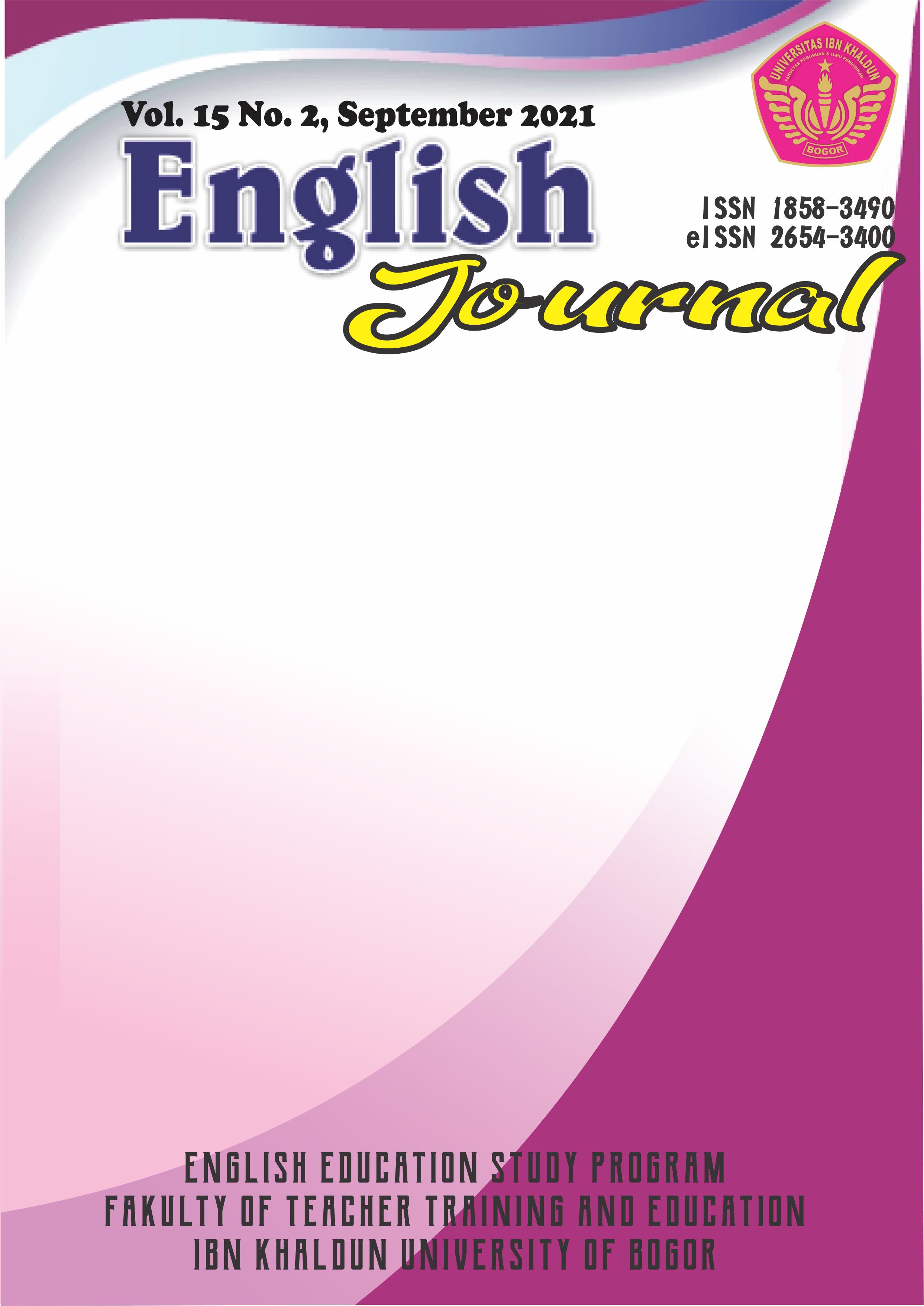POSITIVE DISCIPLINE: SOLUTION TO BOOST STUDENTS' SELF ESTEEM IN LEARNING ENGLISH AS FOREIGN LANGUAGE
DOI:
https://doi.org/10.32832/english.v15i2.5548Abstrak
This theoretical concept is aimed to investigate how positive discipline is implemented in foreign language classroom and improve students' self-esteem. As one of forms of classroom management, positive discipline expects long-term discipline planted in the learners' behavior. There are five principles of positive discipline which can be implemented in language learning; Identifying long-term goals; Providing warmth and structure; Understanding child development; Identifying individual differences; Problem-solving and responding with positive discipline. The implementation of positive discipline which support classroom encouragement and confidence could improve learner's self-esteem. By implementing the positive discipline, teacher also takes advantages on understanding more about his students' character. In addition, learner would realize their long-term goal of learning foreign language which motivates them to be more active in the class.
Referensi
Abdumalikova, F. (2020). Role of Self-Esteem in Second Language Oral and Written Performance. International Journal of Innovation in Engineering Research and Technology [IJIERT], 7(12), 29–32.
Aksoy, K. (2016). Review of Exploring Psychology in Language Learning and Teaching. Eurasian Journal of Applied Linguistics, 2(1), 65–70. https://doi.org/10.32601/ejal.460999
Caisido, D. A. D. G.-. (2020). Self Esteem and Language Learning: Empirical Evidence from the Past Two Decades. Journal of Teaching and Learning English in Multicultural Context (TLEMC), 04 (2). http://jurnal.unsil.ac.id/index.php/tlemc/article/view/1766/1475
Durrant, J. E. (2010). Positive Discipline in Everyday Teaching. https://resourcecentre.savethechildren.net/node/4802/pdf/4802.pdf
Fletcher, A. (2016, April). Positive Discipline and Child Guidance. Extension: University of Misoury. https://extension.missouri.edu/publications/gh6119
Haddad Narafshan, M., & Noori, S. (2018). Enhancing Self-Esteem in Classroom Language Learning: The Potential of Implementing a Strength-Based Positive Psychology Intervention at Higher Education. International Journal of Language Teaching and Education, 2(3), 334–345. https://doi.org/10.22437/ijolte.v2i3.5593
Kazumata, K. (2007). Roles of Self-esteem In Second Language Oral Production Performance. TUJP, 27. https://www.tuj.ac.jp/tesol/publications/studies/vol-27/kazumata.html
Macías, D. F. (2018). Classroom Management in Foreign Language Education: An Exploratory Review. Profile: Issues in Teachers´ Professional Development, 20(1), 153–166. https://doi.org/10.15446/profile.v20n1.60001
Milne, L. (2018). Characteristics of low self-esteem. Counseling Directory. https://www.counselling-directory.org.uk/memberarticles/characteristics-of-low-self-esteem
Mirhadizadeh, N. (2016). Internal and External Factors in Language Learning. International Journal of Modern Language Teaching and Learning, 1(5), 188–196.
Muhia, N., & Team. (2019). Positive Discipline. African Population and Health Center.
Positive Discipline Institute. (2021). What is Positive Discipline? Positive Discipline. https://www.positivediscipline.com/about-positive-discipline
Pramita, G. A. P. (2012). The Contribution of Self-Esteem and Language Learning Strategies to the Students' English Proficency for the Second Year Students of SMA Negeri 1 Denpasar. Universitas Ganesha Press.
Rahimi, M., & Karkami, F. H. (2015). Iranian Journal of Language Teaching Research, 3(1), 57–84.
Richards, K. (2017). Positive Discipline in the Classroom. Positive Discipline Org. https://www.positivediscipline.org/Resources/Documents/PDC-Description.pdf
Rubio, F. (2007). Self-Esteem and Foreign Language Learning. Cambridge Scholar Publishing.
SEVRIKA, H. (2017). Positive Discipline in Managing the Classroom at STIKIP PGRI West Sumatera. Journal Polingua, 6(1).
Sound Discipline. (2015). What is Positive Discipline? http://www.sounddiscipline.com
Tovar, P. A. B., Posada, L. N. U., & Ospina, J. A. R. (2018). Positive Discipline Strategies To Improve Discipline In Classrooms. Universidad Del Quindio.
Watson, C. (2015, September). 6 Key Concept of Positive Discipline (And How to Use Them). Soundview School.
Zuković, S., Stojadinović, D., & University of Novi Sad, Faculty of Philosophy, Department of Pedagogy, Serbia. (2021). Applying Positive Discipline in School and Adolescents' Self-esteem. International Journal of Cognitive Research in Science, Engineering and Education, 9(1), 1–11. https://doi.org/10.23947/2334-8496-2021-9-1-1-11

















1.png)




